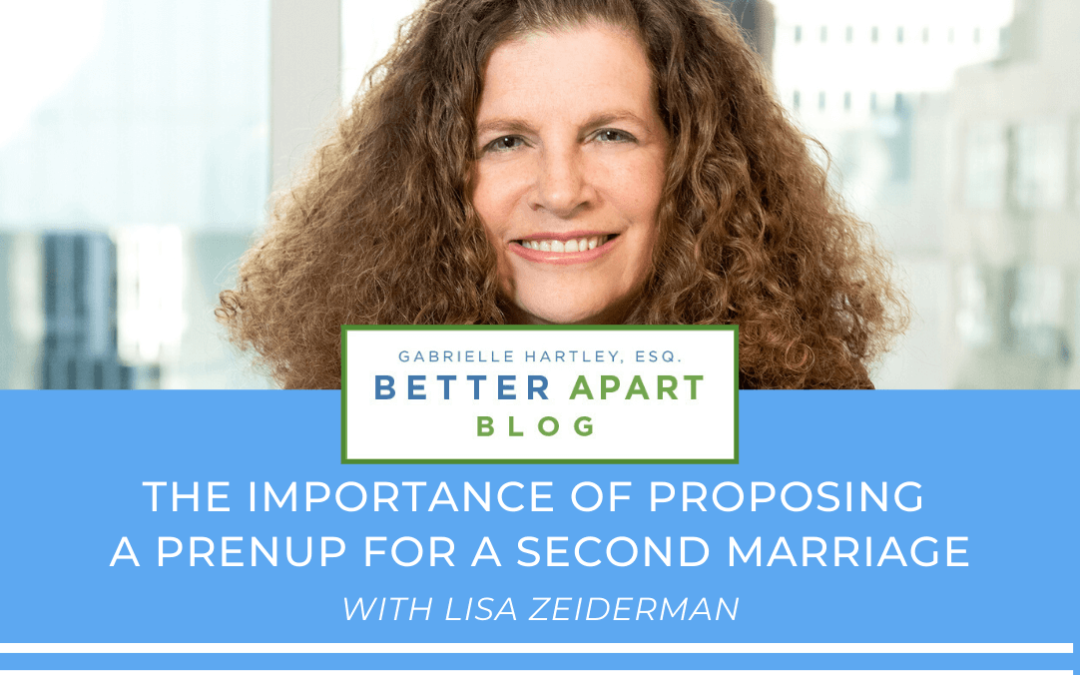By Lisa Zeiderman, matrimonial lawyer and Certified Divorce Financial Analyst
There is something called “Proposal Day,” which occurs on March 20, the Vernal equinox, or the first day of Spring. What better time to celebrate new beginnings?
For those of us who have been married once already, finding another “special someone” provides a sense that you are truly fortunate to have finally found a soul mate the second time around.
But it is also true that while you might be madly in love, marriage is a financial partnership that comes with legal implications. There might be children on either or both sides of the relationship to consider including issues regarding child support owed, spousal support for your former spouse and even the end-of-life distribution of your estate. If you have already created a business, you may want to consider how appreciation to that business during this new marriage will be treated. Are there any health issues on the horizon? In thinking about each of the foregoing issues, you are likely to discover you need to talk about finances with your soon-to-be spouse and make a formal plan before you are legally linked.
Significantly, some statistics show that second and third marriages are more likely to end in divorce than first marriages. Moreover, up to 25 percent of marriages end because of financial issues.
So, as you float along on the cloud of excitement that anticipation for this new chapter, it is critical to carefully consider what your financial union will look like, and as a part of that, how you will discuss the all-important prenup for a second marriage with your soon-to-be spouse.
Prenups are far more common than they used to be
A prenuptial agreement, commonly referred to as a “prenup,” is a legal contract entered into before marriage or civil union that is unique to each couple. Typically, the prenuptial agreement addresses financial issues including division of property and spousal support in the event the marriage breaks down. Usually, it will also include provisions as to what will occur upon the death of either you or your future spouse. In New York state, each spouse under the law is entitled to a right of election, which would protect a spouse from being disinherited. A surviving spouse would under the law be entitled to take the greater of $50,000 or 1/3 of the deceased spouse’s net estate. However, it may be that you and your future spouse decide to waive the right of election in a prenuptial agreement so that you can pass your estate to children from a former marriage. All of the foregoing must be considered as part of the negotiation of the prenuptial agreement.
Given you are two consenting adults who have already gone down the marital road before, it seems reasonable that you can have a conversation about why this is important.
And, you should know that more and more couples are consenting to sign this important contract; it isn’t just for couples with a significant imbalance of wealth.
So, when is the right time to discuss the prenuptial agreement? Well, certainly in advance of the wedding, which perhaps, for a middle-aged couple, means as soon as possible.
Prenups can be romantic, too
Do not despair! The discussion about the prenuptial agreement can actually be quite romantic.
Think about it this way:
*You are now taking another step toward committing yourself completely to another person – in this case, being honest and transparent about important and sensitive issues such as finances.
This means having a complete understanding of your partner’s financial situation, your own financial situation, and also ensuring that you and your future spouse have an agreement to be honest and transparent about financial expenses and expectations going forward. Think of the prenup not as a marker of mistrust, but the establishment of a new trust built on total honesty, even when it’s uncomfortable.
*Another important aspect of discussing a prenup is the realization that with marriage comes planning.
That means being honest about career goals, debt such as school loans and credit cards, expectations about financial obligations to children and future inheritances and assets accumulated from prior marriages.
Why a prenup for a second marriage is particularly important
Marrying again is typically far more complex than the first time, as it is likely you have more assets, perhaps children, and broadly, a life partially lived before this new person came into it.
Here are a few financial scenarios that are common to consider with respect to second marriages, and a few related questions to discuss with your soon-to-be spouse:
- If you or your future spouse are entering the relationship with children from prior marriages, there are many issues to consider, such as payment of child support and college obligations for those children.
- Some topics to discuss include: Will you be contributing to such expenses if your spouse has children from a prior marriage, or will your spouse be utilizing Separate Property assets to pay the same?
- How will you deal with your spouse’s obligations to pay alimony to a former spouse?
- Does your future spouse have an obligation to maintain life insurance for a former spouse?
- Is your future spouse responsible to pay certain expenses for a former marital residence?
- As stated above, what will happen upon your death or the death of your spouse as it relates to finances?
Issues will vary widely for each person and couple, depending on histories and priorities, but the common theme remains the same: be honest and transparent and work through all of the scenarios together.
While hindsight is 20/20, the advantage of entering into a second marriage is that you have learned what issues to spot and how to ensure the peace of mind that a prenup can bring to you and your future spouse.
So, now that you recently proposed (or accepted!) please don’t put off discussing the prenup for your second marriage. It will give both of you a peace of mind that makes your marriage much, much better.
Lisa Zeiderman, a managing partner at Miller Zeiderman & Wiederkehr LLP, a Founding Member of the American Academy of Certified Financial Litigation, a Divorce Financial Analyst, practices in all areas of matrimonial and family law including but not limited to matters involving custody, an equitable distribution of assets, child support and the negotiation and drafting of prenuptial and postnuptial agreements. Ms. Zeiderman is a high energy, zealous and relentless advocate. She strategically and creatively crafts each case from the time of the first consultation to its resolution, in order to achieve the client’s ultimate goals.
While educating the client in the process, so that he/she can obtain realistic goals, Lisa works hand in hand with the client to reach the best possible result in their custody, divorce and/or family law matter. Lisa takes a sincere interest in each individual client never losing touch with the human side of this process making their life changing event as painless as possible.
Lisa, once divorced herself, is married with an 25 year old daughter. She is a Founding Member of the American Academy of Certiifed Financial Litigators (AACFL), a member of the Advisory Board of the AACFL a member of the Legislation Committee of the New York Bar Association, a member of the New York Women’s Bar Association and a member of the Executive Board of the Justice Brandeis Law Society. Lisa has lectured for the New York State Bar Association, the New York Women’s Bar Association and the JCC located in New York, New York on financial and custody related matters. She has published articles in the New York Law Journal and the Family Law Review including an article on drafting of Prenuptial Agreements.
Lisa’s practice areas include Manhattan, Brooklyn, Westchester, as well as Rockland, Orange and Putnam Counties.
P.S. Want more tools and resources to stay positive during a divorce? Download my Free Divorce Survive & Thrive Kit below!
With support and strength,


FOLLOW GABRIELLE

DISCLAIMER: The commentary, advice, and opinions from Gabrielle Hartley are for informational purposes only and not for the purpose of providing legal advice or mental health services. You should contact an attorney and/or mental health professional in your state to obtain advice with respect to any particular issue or problem.
- One Edgewater Plaza Suite 304, Staten Island, NY 10305
- 266 Smith Street, Brooklyn, NY 11231
Northampton MA
PHONE:
New York: (917) 905-4553
Boston: (413) 450-0420


